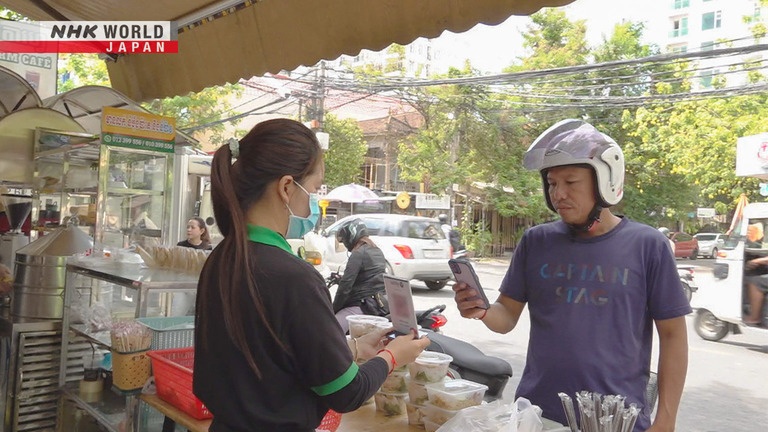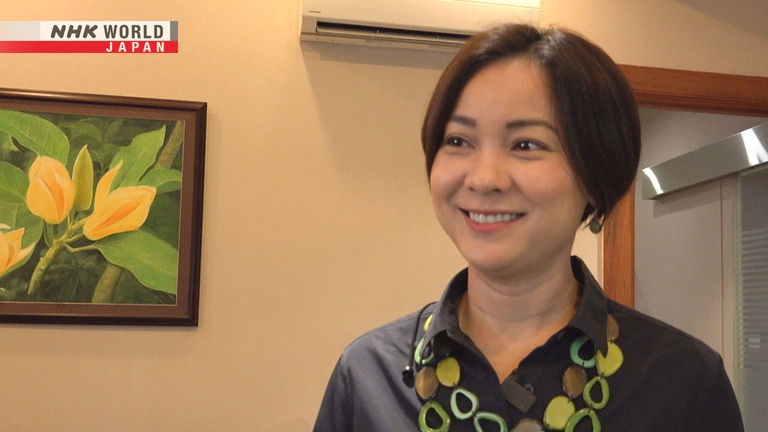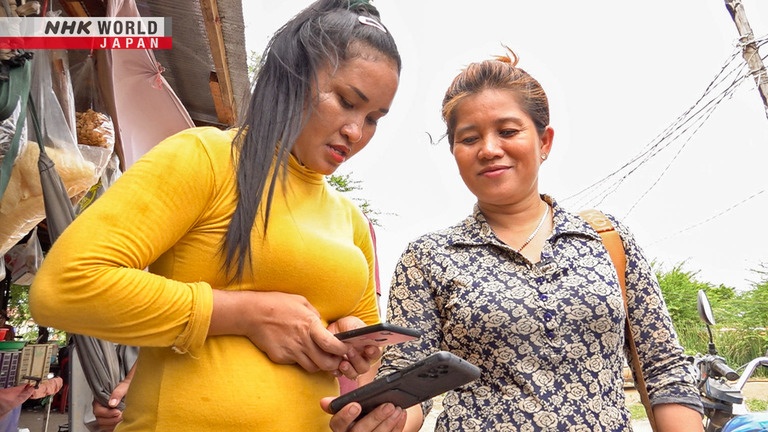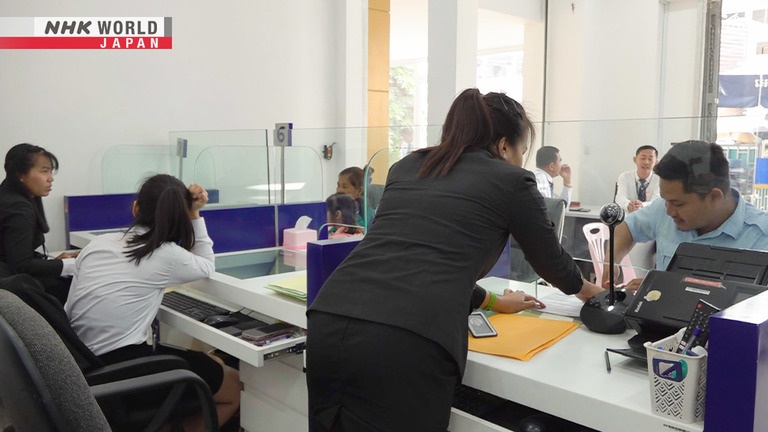A Country Goes Digital: Cambodia
In October 2020, the National Bank of Cambodia became the first central bank in Asia to launch a digital currency. With the US dollar representing 90% of the cash circulating in the country, the bank decided to promote use of domestic currency through technology. Three years on, digital payments are a common sight in urban areas – a huge change for the once cash-focused economy. Now, the bank has turned its sights to rural Cambodia. What will the changes mean for the lives of rural residents?




Transcript
In the 30 years since its civil war, Cambodia has undergone extraordinary economic growth.
In 2020, its central bank took the world by surprise by becoming the first in Asia to introduce a digital currency.
Until now, Cambodia had nothing.
If it all went wrong, we'd have merely returned to where we were.
A success would take us forwards.
We were able to take on this challenge precisely because we were starting from nothing.
We had nothing to lose.
The use of digital currency has spread quickly and widely in Cambodia's cities.
The next challenge will be repeating this success in rural areas.
I don't know much about it,
and I can't read either.
I don't think I'll be able to use it.
How will digital currency change the lives of Cambodians?
Cambodia has maintained strong economic growth.
But only an estimated 10% of the cash in circulation is the Cambodian riel -
the other 90% keeping the economy running is the US dollar.
The country's central bank - the National Bank of Cambodia.
Governor Chea Serey was acutely aware of the dangers this situation posed.
Cambodia's economy is growing at the moment.
We cannot remain dependent on the US dollar.
We must become independent, and we must manage our own economy as we move forward.
That means reducing the amount of dollars in circulation,
and increasing the share of the riel.
Otherwise, the national bank will lose control.
Chea has led a number of policies at the bank to promote the use of the riel.
These efforts included the consideration of digital currencies, beginning in 2016.
For this, she sought out the help of a startup.
A Japanese firm focused on IT development.
It's headed by Miyazawa Kazumasa.
The request from the Cambodian national bank came as a surprise.
I received a message on social media, saying, "We're the Cambodian central bank."
"We're very interested in the blockchain you're developing, and we'd like to know more."
We all figured it was a phishing attempt, you know?
There are a lot of con artists out there and this didn't feel genuine.
Despite his suspicions, Miyazawa decided to visit Cambodia,
where he was warmly welcomed by the bank staff.
The folks at the bank explained that Cambodia was an extremely poor country.
The financial system was kind of a mess.
But they were so determined to make it more convenient for Cambodian people.
Their passion really spoke to me.
I was moved.
I found myself wanting to do something to help this country.
Miyazawa's Cambodia visits made it clear that any digitalization of currency was a long way off.
Everyone only used cash.
No credit cards. No other payment option was available.
Private banks had started launching their own payment apps.
But they'd been developed independently, holding back general adoption.
The QR codes lacked cohesion.
You could only use one app at places that used the services of Bank A, or that banked with Bank B.
Stores wouldn't know which one to adopt.
Would they have to sign up to three different services?
It was a hassle, so they didn't bother with any of them.
This was despite a national rate of mobile ownership of over 100%.
Miyazawa was convinced that simpler payment methods would help digital currency catch on in Cambodia.
The launch of the digital currency was spearheaded by the government,
with a goal to go live in April 2020.
Miyazawa took charge of system development
while Chea ensured financial institutions would be ready in time.
But as launch day drew near, a global pandemic took hold.
In October 2020, six months behind schedule,
Cambodia's central bank became the first in Asia to launch a digital currency system.
The system is named Bakong after an ancient Cambodian temple.
COVID-19 provided an unexpected tailwind to the new currency's adoption.
ABA Bank QR code.
Thank you.
It's convenient, it's quick.
Low risk of infection as well.
We reopened our business
once infection slowed down.
Lots of customers had started
using payment apps.
Fears of infection slowed the use of cash,
and many people turned instead to digital payments.
Bakong has also helped streamline the disparate payment systems used by different banks.
The previous hassles of transferring between different banks were ironed out,
helping digital payments take off even faster.
Digital currency is starting to change local lifestyles.
Elementary school teacher Chhun KoLyan.
With two children, a job, and plenty of housework, she's a busy woman.
She showed us her bimonthly water bill.
It comes to 148,250 riel.
She makes the payment through an app.
Paying now.
It's so convenient.
Previously, utility bills could only be paid in cash at the vendors.
They became crowded close to payment deadlines, and she often had to line up for hours.
All the hours it took me
to pay the water bill.
Now I use them for laundry, cooking,
and looking after my kids.
It's precious time.
Digital payments are becoming part of everyday life.
It's wonderful to see how it's providing citizens with more choices.
We're seeing young people use QR codes as part of everyday life.
I think that it all promotes the habit of using financial services.
Behind the national bank's decision to go digital lies a complex local history.
Cambodia's civil war began in the 1970s and lasted over 20 years.
Under a dictatorship, the national bank stopped functioning altogether for several years.
The value of the riel plummeted.
Following the end of the war, UN relief efforts spurred the use of the US dollar.
Cambodia became a nation of two currencies.
The dollar was a vital step on the road to economic recovery.
Another barrier to using the Cambodian riel is the awkward nature of its paper currency.
Take a large bundle of riel to the exchange...
...and receive just three notes in dollars.
335,000 riel is 80 dollars.
Easy to carry.
Riel is just so bulky.
The national bank decided that cash alone wouldn't be enough to encourage use of the riel.
If there are too many dollars in circulation,
the national bank will lose control of the economy.
We handle the minting of the riel, and decide when it needs to be collected.
But we have no such control over other currencies.
Only over the riel.
That's why we designed the Bakong system
to promote the use of a homegrown Cambodian currency.
Three years after its launch,
the use of digital currency is a common sight in Cambodia's urban areas.
But it hasn't quite reached every corner of the country.
Young people are happy to use the Bakong system.
Older, and middle-aged citizens, meanwhile, still see cash as a safer alternative.
And there can still be connectivity issues in rural areas, for example.
Everyone still uses cash there.
A five-hour drive from Phnom Penh.
The district of Banan in Battambang province, in Cambodia's northwest.
It's close to the Thai border, and most of the locals are farmers.
What do people here think about digital currency?
I know you can make payments
with a smartphone.
But I don't know how to do it.
I'd like to try it and
see how convenient it is.
But I don't know much about it,
and I can't read either.
I don't think I'll be able to use it.
I don't have much money anyway.
I use what I have. I don't
have money to put in a bank.
Many people in rural areas don't even use banks - let alone digital payments.
To address this, the national bank is calling on private banks
to leverage the new digital currency to help promote the use of banking services.
Regional branches will play a key role.
Only 30% of local residents in this region have bank accounts.
Raising that number will be the first task.
Branch manager Eap Visal.
We visit homes and businesses.
We explain the benefits of using
a bank, how we can help them.
I hope that talking face to face
makes a difference.
The Banan branch is especially focused on home visits.
The team makes five to six calls a week.
After a 20-minute bike ride...
...they arrive at the home of farmer Yuom Han.
After a good harvest, Yuom sees revenue of up to 40 million riel, or around 10,000 dollars.
But he's never put money in a bank before.
He keeps large amounts of cash in a drawer beside his bed.
I know if anyone comes close,
even if I'm sleeping.
I'm careful when there's a lot.
I have to take it all with me
when I travel, because I worry.
The bank workers explain their services.
You can open an account with us.
I don't understand complex stuff.
Once it's in an account,
it's totally safe.
You must worry about theft
after the harvest.
It will be 100% safe in the bank.
We can link your account
to your phone to make payments.
It's very convenient.
You can pay by QR code
for gas or diesel.
Really?
Yuom isn't sure whether he can manage alone.
What do I do?
He decides to give it a try with his daughter's help.
- Enter the amount.
- Where?
I'll try 2,000 riel.
He completes his first digital payment.
I'm worried about mistakes.
I'll practice with my daughter.
I'd like to try with small amounts.
If I keep trying, I'll figure it out.
Just a casual, personal chat.
We don't want to push too far at once.
We can take it further from there.
Next, they visit Vong Yarith, a farmer who had began using digital payments six months ago.
She and her husband own and raise 3,000 ducks.
They make a living selling their eggs.
She uses an app to pay for feed and other items
which previously required a visit to a transfer service.
Some stuff is great.
I don't have to pay the transfer fee.
I'm still not used to it.
And it makes me nervous.
I sometimes go and check
there's still money in the account.
The duck eggs are sold at market every day.
It's a 30-minute ride on the bike.
Yarith's husband carries the eggs while she handles the cash.
Thank you!
She's gradually using the app more and more for her transactions.
Hold still.
Your hand's shaking! So's mine.
Let's do it on the table.
It's hard to keep still!
Today, around half of their buyers pay digitally.
Eventually, Yarith expects to go fully digital.
Then I can just stay home.
My husband can bring the eggs
and receive payments on the app.
Yarith is also planning to expand the farm.
I want to have more animals.
Dig a big pond with the money
from the duck eggs.
Raise and sell fish too.
It means we can save more.
Feeding the ducks each morning, I see
them grow and know it means an income!
It makes me smile!
This suburban cafe is popular with young locals.
It's run by 26-year-old Rieng Chanra.
Digital currency played a major role in building her dream business.
Hello!
Rieng was born and raised in the area,
and achieving her dream was a long, hard slog.
A major turning point came 11 years ago.
My family raises cattle.
Dad managed the farm alone.
One day thieves stole the cattle
money and left Dad injured.
We couldn't do anything for
some time and lost all our income.
Rieng went to work in Thailand to help keep the family afloat.
There, she discovered coffee and began dreaming of her own cafe.
She studied for six years while sending money home, and opened her store in 2019.
I started with a stall.
Nobody in the area knew about
or drank coffee.
I was the first to open a cafe.
I had only $500 to start.
It was hard to get supplies.
My budget was so small
I would close up each evening...
...then shop for the next day
with the proceeds.
18 months after she opened the cafe, the arrival of Bakong changed how she placed orders.
Now, she can message wholesalers and have ingredients arrive the same day.
Thank you.
After checking the delivery, she pays through an app.
It saves so much time.
I don't need to shop,
count out notes, or wait for change.
Most customers pay through an app too.
The adoption of the digital currency system allows everyone to pay this way,
no matter who they bank with, and more and more customers are using it.
The apps also make it easy to access a list of these transactions.
I can track my income and
expenses on the app.
I know how much I can buy.
I can also see if I'm getting
more or fewer customers.
Rieng has transformed her little stall into a thriving cafe in just four years.
And she has four times as many customers.
I like iced lattes and coffees.
The coffee here is so good.
I really enjoy it.
I come five times a week.
It's quiet, the coffee's good.
And so is the service.
Rieng's revenue continues to grow, and she has plans to open a second location.
Not a big place,
a casual branch for people to visit.
Young people want clean, chic places,
but they have no money.
I was the same.
I understand how they feel.
I want to give those people
a place like that.
Cambodia's digital currency is changing rural lives for the better.
With digital payments quadrupling in the space of a year,
and usage of domestic currency on the rise,
it's clear that the national bank's efforts are bearing fruit.